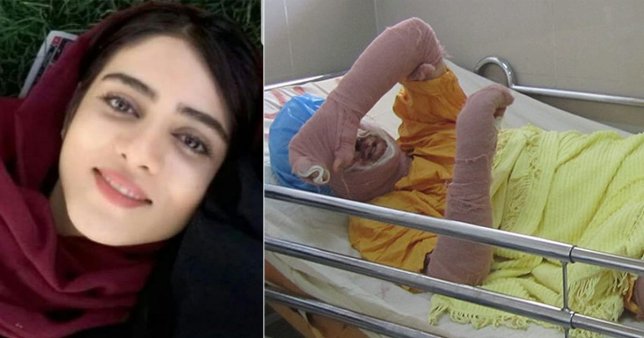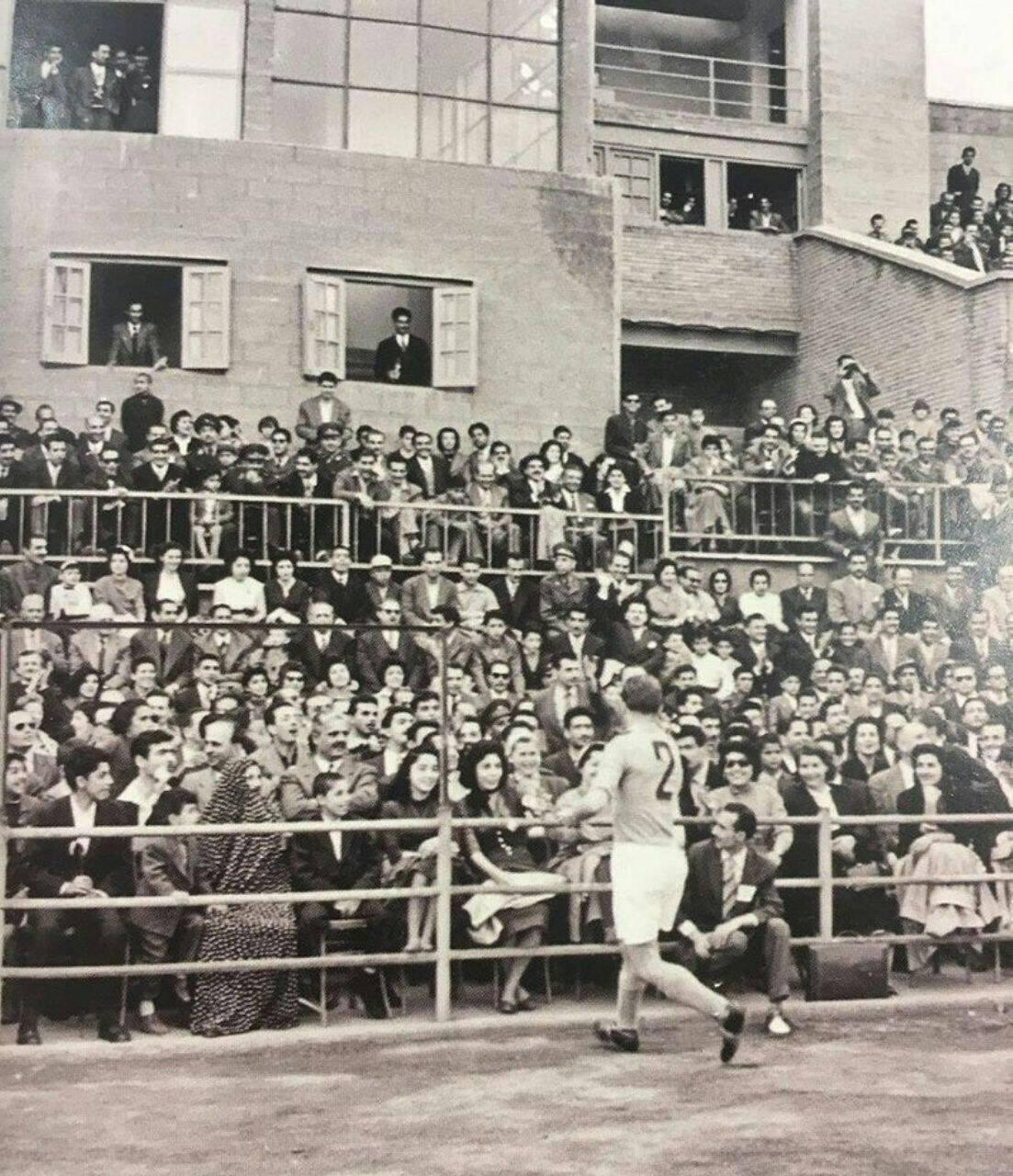Earlier this month, Sahar Khodayari set fire to herself after being sentenced to six months in prison for the ‘crime’ of watching a football match. I contacted Shireen Ahmed and asked her to write something for the site about what happened and why because I believe this needs to be put in front of as many people as possible. Don’t look away. Please read on…
Sahar Khodayari was a young woman who lived and loved Esteghlal. She painted her face blue and attended matches dressed up as a man – which women supporters often do.

But they do this at great risk.
Sahar Khodayari, later named Blue Girl, was arrested in March of 2019 and was sentenced to six months in prison.
Her sentence was delayed and she set herself on fire outside the courtroom.
She succumbed to her severe injuries a few days later.
It has been reported that Khodayari was suffering from a mental illness, but the reason for her distress is rooted in the fact she was forcibly removed from the game she loved so much.
Open Stadiums tweeted reports that Iranian state media is intimidating supporters and activists who are speaking up publicly about #BlueGirl.
There have been numerous postings on social media – including from the Esteghlal FC, the club she adored.
Our dear Sahar burnt herself to death, when she was charged to 6 month in jail for … going to the stadium to support her #Esteghlal.
She supported us despite the politics made it illegal for her, but what we do can do to support her? ABSOLUTELY NOTHING.We are cowards. pic.twitter.com/VTKKa0jvIN
— Esteghlal (@EsteghlalFC_En) September 9, 2019
I first started communicating with ‘Sara’ in 2013 after seeing an online story about the struggle of Iranian women to get into stadiums. She was part of the OpenStadium organization, a movement to end discrimination against Iranian women, that lobbied international sports federations to advocate for women in stadiums.
As a sports writer who focused on Muslim women in sports, I was surprised because of the rich history of Iranian women in sport.
The women’s futsal team has won the Asian Football Confederation title multiple times, and they have an ever-growing fan base.
https://twitter.com/EsteghlalFC_En/status/1172106213301084161
The love of football is a passion in Persian blood. There is not only a rich history of female athletes, but also of women attending matches before 1979.
After the revolution in Iran, Islamic law was rigidly implemented, and women were barred from attending any sporting events. This meant that for the legions of women fans who supported famous Iranian clubs, like Esteghlal FC or Persepolis FC, they were effectively shunned from supporting and enjoying the beautiful game in public.
The stands that once sat both men and women, were now off-limits to women.

As the years went by, I continued to follow Sara and Open Stadiums by writing and sharing her tweets, and trying to remind the mainstream sports media world that this was, in fact, a huge stain on the goodness of sport in our world.
The cries of these women were not in joy while watching from the stands, but in anger and sadness from behind gates and walls.
Sara and Open Stadiums have been on the frontlines protesting and mobilizing to bring change to Iran. The rule, which is inconsistent in its application and methodology, states that Iranian women cannot attend matches in public places in Iran, and therefore can not be spectators at sporting events.
Both Amnesty International and Human Rights Watch have called on FIFA to help end this ban.
Ironically, the ban does not apply to women who are not Iranian who come to support their teams which renders this law further nonsensical.
The frustration of women is palpable.
A basic right to enjoy sport is violated, although it is supposedly entrenched in the statues of both FIFA, FIVB, FIBA and other sports federations. Yet, they sit idly by and watch women get detained, or refused entry to matches and games. Azadi stadium is at the core of the unrest, because the famous stadium is the heart and home of Team Melli, the Iranian men’s team.
To expect that women will not want to cheer on a team they love and that brings them pride and happiness, is absurd.
But over the years, in different cities- including Asfahan and Shiraz, there have been sporting events where women do attend from time to time. There is a growing culture of sport ranging from football to surfing, with women leading the way.
But providing support for women athletes doesn’t justify the fact that they are kept from watching from the stands.
FIFA’s complicity is breathtakingly gross. In March of 2018, Gianni Infantino was present for the Tehran derby (a match between Esteghlal and Persepolis) as 34 women were detained for attempting to watch the very same game.
As media caught hold of this story, FIFA were forced to comment and act, albeit meekly.
For a brief instant, it seemed as if women were going to be permitted into Azadi stadium during the Men’s World Cup in 2018, and thereafter.
https://twitter.com/BabaGol_/status/1052234037929156609
But that sense of joy subsided quickly and Open Stadiums continue to chronicle instances of women being barred from various events.
Change was inconsistent and brief.
FIFA made the required statements about the issue and scheduled a meeting between Fatma Samoura, FIFA’s Secretary General and one of the activist groups. Sara and her fellow Iranian football lovers are not looking for one-offs. They are looking for permanent change, and liberation from the bars that keep them away from watching matches.
The next World Cup qualifying match to be played at Azadi stadium will be against Cambodia on October 10, 2019. There has been no confirmation that women will be allowed to attend. Nor any indication that Iran and the Football Federation Islamic Republic of Iran (FFIRI) will suffer consequences for disobeying FIFA charter statutes and refusing entry to women.
For it’s part, the AFC continues to remain boorishly inactive and ignorant, shying away from any meaningful engagement on this issue.
Sahar Khodayari’s death has been traumatic for those activists lobbying for access and betterment of women’s sport in Iran. Her death was a glimpse into the despair and sadness that comes from being isolated.
But we cannot be silent.
It is time to not only honour Sahar’s memory and continue to push for change, but to adamantly support the fight of those who have been rallying for over 15 years.
Leaders in women’s football have spoken out, including Kosavare Asllani and Hedvig Lindhal, of the Swedish national women’s team. French National player and World Cup Champion Paul Pogba and Jerome Boateng of FC Bayern also tweeted their condolences and used the hashtag #BlueGirl. Lindahl shared a link to the newest Change.Org petition directed at FIFA. A previous petition amassed over 287,000 signatures.
Football clubs around the world including AS Roma, FC Union Berlin, and arguably one of the most popular teams in the world, FC Barcelona joined in.
The reality is that Sara will continue to protest, and the community of activists will continue to write letters, distribute petitions. But how many times must Sara have the gates shut in her face?
I will continue to hope that she stays safe.
As football clubs begin speak up in solidarity, what needs to happen is that those who truly love football must not remain silent. Adding pressure on FIFA and the AFC, is critical.
Amplifying stories and sharing news about them is also important.
It also reminds the women in Iran that they are not alone.
We see this injustice but we will not tolerate it.
We know that lives depend on a swift resolution.

